Education
Knowledge of Mathematics Can Drive Nigeria’s Economic Growth, Innovation’ – Okwuwe Chukwunalu
Published
2 years agoon
‘
Okwuwe Chukwunalu Joshua is a seasoned Mathematics tutor and avid chess enthusiast. He is also a certified professional teacher by the Teacher Registration Council of Nigeria and a certified Mathematics teacher by the Texas, USA Education Authority.
Over the past 16 years, he has inspired a love for Mathematics in his students through both in-person and online lectures, including his YouTube channel.
In this interview with DAYO EMMANUEL, he shares his journey and discusses the factors that lead Mathematics graduates to pursue careers outside of invention and problem-solving in the tech industry.
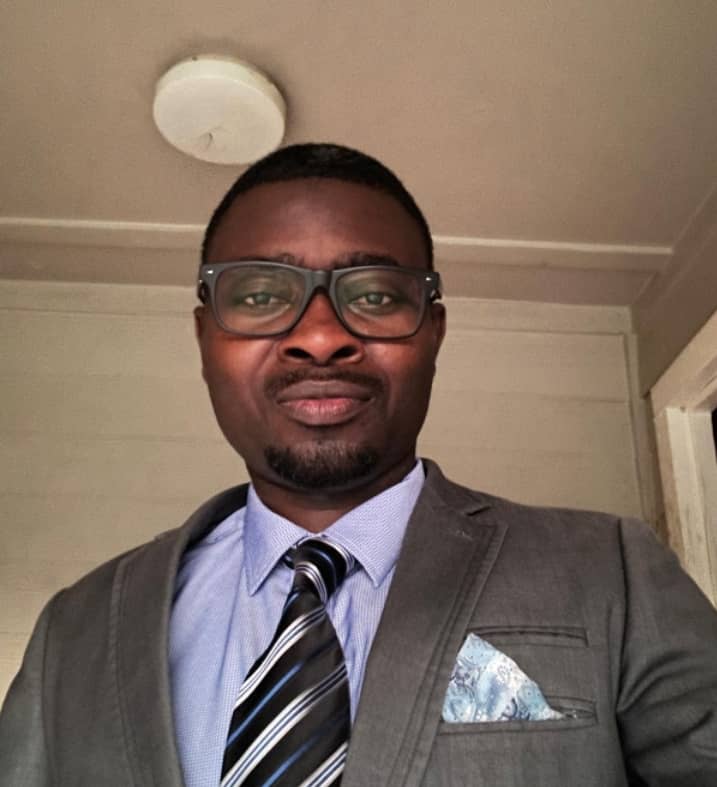
He however believes if the Nigerian government creates enabling environment for Mathematics graduates, inventors can emerge from among them to patent problem solving products to benefit the society.
Excerpts:
What inspired you to pursue a career in mathematics education?
Here are some factors that inspired me to pursue a career in mathematics education:
a. Passion for Mathematics:
I have a deep love for mathematics itself, finding joy in solving problems, exploring patterns, or understanding mathematical concepts. This passion naturally lead me to wanting to share that enthusiasm with others.
b. Influence of Teachers:
I had an inspiring mathematics teachers or mentors who ignited my interest and showed me the impact a great educator can have on students’ lives. His dedication and teaching greatly influenced my decision to pursue a similar path.
c. Desire to Make a Difference:
Teaching mathematics allows me to make a direct impact on students’ learning and development. For me as an educator, the opportunity to help others understand and appreciate math is highly fulfilling.
d. Career Stability and Demand:
The field of mathematics education often offers stable job prospects and opportunities for growth, this was appealing for me from a career perspective.
How has your passion for chess influenced your teaching methods?
My passion for chess has significantly influenced my teaching method in several ways:
a. Strategic Thinking and Problem-Solving:
Chess involves strategic thinking, planning ahead, and problem-solving. I incorporate these elements into my teaching by encouraging students to think critically, analyze situations, and develop strategic approaches to solve mathematical problems.
b. Pattern Recognition:
In chess, recognizing patterns is crucial for identifying tactics and planning moves. Similarly, in mathematics, recognizing patterns can aid in understanding concepts and solving problems efficiently. I help students develop this skill by highlighting patterns in mathematical problems or concepts.
c. Decision-Making and Calculated Risks:
Chess involves making decisions based on careful analysis and weighing risks. This parallels mathematical problem-solving, where students often need to make decisions about which method or approach to use. My teaching emphasizes the importance of thoughtful decision-making and evaluating the consequences of different strategies.
d. Persistence and Resilience:
Chess teaches resilience in the face of setbacks and the importance of learning from mistakes. I foster a growth mindset in my students by encouraging them to persevere through challenging mathematical problems, learn from errors, and continuously improve their skills.
Can you share any success story from your 16 years teaching experience that highlights your impact on your students?
Certainly! Here’s a success story that showcases impact on students:
One of the most memorable successes in my 16 years of teaching came from a student named Chinedu. Chinedu had always struggled with mathematics and lacked confidence in his abilities. He often felt overwhelmed by the subject and was on the verge of giving up.
Recognizing his potential, I took a personalized approach to support his learning journey. I spent extra time with Chinedu, breaking down concepts into manageable parts and providing clear explanations tailored to his learning style. I encouraged him to see mathematics not as a daunting challenge, but as a series of puzzles waiting to be solved.
Gradually, Chinedu’s attitude towards math began to shift. He started asking more questions, seeking deeper understanding, and even participating actively in class discussions. I noticed his confidence and growth as he successfully tackled problems he once found intimidating.
The turning point came during a class project where students had to apply mathematical concepts to real-world scenarios. Chinedu chose to work on a project involving statistics in sports, a topic that sparked his interest. With guidance and encouragement, he not only completed the project but also presented his findings confidently to the class. Seeing Chinedu’s transformation was incredibly rewarding. By the end of the year, he had not only improved his grades significantly but also developed a newfound passion for mathematics. His parents even remarked on how much more confident and enthusiastic he had become about his academic abilities.
Chinedu’s success story serves as a reminder of the impact that dedicated teaching and personalized support can have on a student’s life. It reaffirmed my belief in the importance of nurturing each student’s strengths and building their confidence, ultimately helping them achieve their full potential in mathematics and beyond.
What are some of the key strategies you use to foster a love for mathematics among your students, especially those who may initially struggle with the subject?
Fostering a love for mathematics among students, especially those who initially struggle with the subject, requires a combination of strategies that engage, motivate, and build confidence. Here are some key strategies I use based on my teaching experience:
a. Relatable and Real-World Connections:
I connect mathematical concepts to real-life situations that students can relate to. Showing them how math is used in everyday life, in various professions, and in solving practical problems. This helps students see the relevance and applicability of what they are learning.
b. Differentiated Instruction:
I recognize that students have different learning styles and paces of understanding. Provide differentiated instruction by offering various approaches to learning a concept, such as visual aids, handson activities, group work, or individualized practice. This allows students to engage with the material in ways that best suit their learning preferences.
c. Positive and Supportive Environment:
I create a classroom environment where mistakes are viewed as opportunities for learning and growth. Also, I encourage a growth mindset by praising their effort, persistence, and improvement rather than just outcomes. I also, build a supportive community where students feel comfortable asking questions and sharing their ideas.
d. Hands-On Learning and Exploration:
I incorporate hands-on activities, manipulatives, and interactive games to make abstract mathematical concepts more concrete and tangible. Encourage exploration and discovery through problem-solving tasks that involve critical thinking and reasoning.
e. Personalized Feedback and Goal Setting:
I provide constructive feedback that is specific and actionable, focusing on both strengths and areas for improvement. More so, help my students set achievable goals and track their progress over time. I celebrate their successes and milestones along the way to boost their confidence.
f. Use of Technology and Multimedia:
I integrate technology tools, educational apps, simulations, and multimedia resources that enhance engagement and understanding of mathematical concepts. Virtual manipulatives, interactive videos, and educational games make learning math more dynamic and interactive.
g. Incorporate Creativity and Open-Ended Tasks:
I offer open-ended tasks that encourage exploration, experimentation, and the application of mathematical principles in novel ways.
h. Encourage Collaboration and Peer Learning:
I Foster a collaborative learning environment where students can work together, discuss ideas, and learn from one another. I encourage peer tutoring or group projects this provide additional support and reinforce understanding through peer explanations and discussions.
How do you envision contributing to the growth and success of Ross Shaw Sterling Aviation Early College High School students in Mathematics and what specific initiative do you have in mind to elevate the school standing in the education industry?
To contribute to the growth and success of Ross Shaw Sterling Aviation Early College High School students in Mathematics and elevate the school’s standing in the education industry, I envision implementing the following strategic initiatives:
a. Enhanced Mathematics Curriculum: Develop a rigorous and comprehensive mathematics curriculum that aligns with state standards and emphasizes real-world applications relevant to aviation and aerospace. Integrate aviation-related problems, simulations, and case studies into mathematics lessons to make the subject more engaging and practical for students.
b. STEM Integration:
Foster interdisciplinary connections between mathematics and other STEM (Science, Technology, Engineering, and Mathematics) subjects. Collaborate with science and engineering departments to create projects and activities that demonstrate the application of mathematics in aviation, such as aerodynamics, navigation systems, and aircraft design.
c. Project-Based Learning:
Implement project-based learning (PBL) initiatives that require students to apply mathematical concepts to solve aviation-related challenges. Encourage collaborative teamwork, critical thinking, and problem-solving skills through projects that simulate real-world scenarios in aviation operations, logistics, or engineering.
d. Aviation Mathematics Electives:
Offer specialized electives or advanced courses in aviation mathematics for students who wish to delve deeper into mathematical principles specific to aviation. Topics could include flight planning and navigation calculations, aircraft performance metrics, aviation safety analysis, and statistical methods used in aviation research.
e. Technology-Enhanced Learning: Leverage educational technology tools and software to enhance mathematics instruction. Utilize interactive simulations, virtual labs, and mathematical modeling software that allow students to visualize complex mathematical concepts and their applications in aviation. Provide access to online resources and digital platforms that support self-paced learning and individualized instruction.
f. Professional Development for Teachers:
Provide ongoing professional development opportunities for mathematics teachers to enhance their content Knowledge and pedagogical skills. Offer workshops, seminars, and training sessions focused on innovative teaching strategies, technology integration, and differentiated instruction techniques tailored to mathematics education in aviation contexts.
g. Partnerships with Industry Experts: Establish partnerships with aviation industry experts, mathematicians, and researchers to enrich mathematics education at the school. Invite guest speakers to discuss the role of mathematics in aviation careers, conduct workshops on specialized mathematical topics, and mentor students in mathematics-related projects or competitions.
h. Assessment and Data-Driven Instruction:
Implement regular assessment practices to monitor student progress in mathematics proficiency and problem-solving abilities. Use data analytics to identify areas for improvement and tailor instruction to meet individual student needs. Foster a culture of continuous improvement by using assessment data to refine curriculum, instructional strategies, and support interventions.
How do your skills as a Mathematics teacher enhance your ability to contribute to STEM education in America?
My skills as a Mathematics teacher can significantly enhance my ability to contribute to STEM education in America in various ways:
a. Foundation for STEM Learning:
Mathematics is the cornerstone of STEM education. As a Mathematics teacher, I provide students with the essential tools and foundational knowledge required to excel in other STEM subjects. My ability to teach critical thinking, problem-solving, and analytical skills directly supports students’ success in science, technology, and engineering.
b. Promoting Interdisciplinary Learning:
My expertise in mathematics allows me to integrate mathematical concepts with other STEM disciplines. I will design interdisciplinary projects and curricula that highlight the connections between math and other fields, such as physics, engineering, and computer science, making learning more relevant and engaging for students.
c. Encouraging Inquiry-Based Learning:
My experience with mathematical inquiry and exploration can be applied to other STEM subjects. By fostering a classroom environment where students ask questions, Explore multiple solutions, and engage in hands-on activities, I help develop their curiosity and critical thinking skills across the STEM spectrum.
d. Use of Technology and Tools:
Mathematics teaching often involves the use of various technological tools, such as graphing calculators, computer algebra systems, and educational software. My familiarity with these tools can be leveraged to incorporate technology into STEM education, preparing students for the digital age and enhancing their learning experiences.
e. Data Analysis and Interpretation:
My skills in teaching data analysis and interpretation are crucial for all STEM fields. By helping students understand how to collect, analyze, and interpret data, I equip them with the skills needed to conduct scientific research, analyze engineering problems, and make data-driven decisions in technology.
f. Building Problem-Solving Abilities:
Problem-solving is a key component of both mathematics and STEM education. My ability to teach students how to approach and solve complex problems prepares them for challenges they will face in science, technology, engineering, and mathematics careers.
In what ways have your volunteer experiences as a Mathematics tutor and youth mentor influenced your professional approach and outlook on education?
My volunteer experiences as a Mathematics tutor and youth mentor have had a significant impact on my professional approach and outlook on education in several key ways:
a. Deepened Understanding of Diverse Learning Needs:
Volunteering as a tutor and mentor exposed me to a wide range of student backgrounds and learning styles. This experience has helped me develop a more empathetic and flexible approach to teaching, understanding that each student has unique needs and requires personalized support to succeed.
b. Enhanced Communication Skills:
Working closely with students in a volunteer capacity has honed my ability to explain complex concepts in My volunteer work has have made me more aware of the educational disparities that exist among different student populations. This awareness has strengthened my commitment to promoting equity in education, ensuring that all students, regardless of their background, have access to high-quality learning opportunities.
c. Developed Patience and Perseverance:
Tutoring and mentoring require a great deal of patience and perseverance, especially when working with students who struggle academically or face personal challenges. These qualities have help me in the classroom, where persistence and a positive attitude can inspire and motivate students to overcome obstacles.
d. Fostering a Growth Mindset:
Through my volunteer experiences, I have seen firsthand the power of a growth mindset—believing that abilities can be developed through dedication and hard work. This perspective influences my professional approach which motivate me to instill the same belief in my students, helping them build resilience and a love for learning.
e. Building Stronger Student-Teacher Relationships:
Mentoring has taught me the importance of building strong, trusting relationships with students. These relationships are the foundation of a positive learning environment, which has helped my students to feel supported and are more willing to take risks and engage in the learning process.
f. Applying Real-World Connections:
My work as a tutor and mentor has provided insights into the real-world applications of mathematics, which I bring into the classroom. By connecting abstract mathematical concepts to everyday life and practical situations, I make learning more relevant and engaging for my students.
As a strong advocate for continuous professional growth, what certifications and training have you pursued?
As a strong advocate for continuous professional growth, I am a certified professional teacher by the Teacher Registration Council of Nigeria and a certified Mathematics teacher by the Texas Education Authority. I have engaged in a series of professional development training organized by the Houston Independent School District, earning certifications in areas such as Appropriate Workplace Behavior, IT-Compliance:
Cybersecurity, GT Differentiated Curriculum, PT-Compliance 2022: Sexual Harassment and Title IX, AIT-Compliance: Social Media, SS-Compliance 2022: Student Bullying simple, relatable terms. This skill is invaluable in the classroom, where clear communication is essential for effective teaching and fostering student understanding.
c. Strengthened Commitment to Equity in Education:
Awareness, Building Trauma-Sensitive Schools, You Might Have a G/T Student, KB Raptor Alerts, GT Social and Emotional Needs of Gifted/Talented Students, and SE QIC Special Education Supports for Students in General Education.
How have these impacted your teaching practice and effectiveness?
My extensive certifications and professional development training have significantly impacted my teaching practice and effectiveness in several key ways:
a. Enhanced Classroom Management:
Certification in Appropriate Workplace Behavior and Compliance Training on issues like Sexual Harassment and Title IX have equipped me with the skills to create a safe and respectful learning environment. This knowledge ensures that I effectively address inappropriate behavior and foster a positive classroom atmosphere conducive to learning.
b. Improved Technology Integration:
IT-Compliance: Cybersecurity training has enhanced my ability to integrate technology safely and effectively into my teaching. I am better prepared to protect student data and use digital tools to enhance learning, which is increasingly important in today’s technology-driven educational landscape.
c. Advanced Differentiation Skills:
GT Differentiated Curriculum and You Might Have a G/T Student certifications have deepened my understanding of how to tailor instruction to meet the needs of gifted and talented students. This enables me to provide appropriate challenges and support, ensuring all students can reach their full potential.
d. Increased Sensitivity to Student Needs:
Building Trauma-Sensitive Schools and Social and Emotional Needs of Gifted/Talented Students training have made me more aware of the emotional and psychological needs of my students. This awareness allows me to create a more supportive and empathetic classroom environment, where all students feel understood and valued.
e. Enhanced Awareness of Student Safety:
Student Bullying Awareness and Raptor Alerts certifications help me to be vigilant about student safety and well-being. I am better equipped to identify, prevent, and address bullying and other safety concerns, fostering a secure environment for learning.
f. Strengthened Support for Special Education:
Special Education Supports for Students in General Education training has provided me with strategies to support students with special needs within the general education classroom. This training also help me to adapt my teaching methods to accommodate diverse learners and promote inclusivity.
g. Professional and Ethical Conduct:
My certification by the Teacher Registration Council of Nigeria and the Texas Education Authority reflects my commitment to maintaining high professional and ethical standards. This credibility boosts my confidence and ensures that I adhere to best practices in education.
h. Continuous Professional Growth:
My ongoing engagement in professional development demonstrates a commitment to continuous learning and improvement. This proactive approach ensures that I stay current with the latest educational practices and research, continually enhancing my teaching effectiveness.
i. Personal Growth and Confidence:
These certifications and trainings not only enhance my professional skills but also contribute to my personal growth and confidence as an educator. They show my dedication to being a well-rounded, knowledgeable, and effective teacher who is prepared to meet the diverse needs of my students.
What inspired you to write “100% Guide to All Common Entrance?
Examination in Mathematics and Quantitative Reasoning,” and why do you believe this resource will benefit students preparing for common entrance exams?
My inspiration for writing “100% Guide to All Common Entrance Examination in Mathematics and Quantitative Reasoning” stems from several key motivations:
a. Passion for Mathematics Education: As a dedicated mathematics teacher, I have a deep passion for the subject and a strong desire to share my knowledge with others. Writing this guide allows me to extend my impact beyond the classroom and help a broader audience of students.
b. Identifying Student Needs:
Through my teaching and tutoring experiences, I have noticed common challenges and gaps in students’ understanding of mathematics and quantitative reasoning. This inspired me to create a comprehensive resource that addresses these areas and provides clear, accessible explanations and practice problems.
c. Commitment to Student Success:
My commitment to helping students succeed academically drives me to create resources that support their learning and exam preparation. I understand the importance of a strong foundation in mathematics for students’ future academic and career opportunities, and I want to provide them with the tools they need to excel.
d. Personal Experience:
My own experiences with standardized testing and entrance exams have highlighted the need for effective study guides. I understand the stress and pressure students face during exam preparation and wanted to create a resource that simplifies the process and builds their confidence.
e. Professional Growth and Contribution: Writing this guide is a way for me to contribute to the field of education and professional development. It showcases my expertise and dedication to continuous improvement, while also providing valuable support to students and fellow educators. I believe this resource will benefit students preparing for common entrance exams for several reasons:
a. Comprehensive Coverage:
The guide offers thorough coverage of all topics commonly tested in mathematics and quantitative reasoning entrance exams.
This ensures that students have access to all the material they need in one place, saving time and effort in their study process.
b. Clear Explanations:
I have designed the guide to provide clear, step-by-step explanations of mathematical concepts and problem-solving techniques. This makes complex topics more understandable and accessible to students of varying skill levels.
c. Practice Problems and Solutions:
The inclusion of numerous practice problems with detailed solutions helps students reinforce their learning and apply what they have studied. It also allows them to practice exam-style questions and improve their problem-solving speed and accuracy.
d. Confidence Building:
By offering structured guidance and ample practice opportunities, the guide helps build students’ confidence in their mathematical abilities. This confidence is crucial for performing well under exam conditions.
e. Focus on Common Pitfalls:
My experience as a teacher has given me insight into common mistakes and misunderstandings that students encounter. The guide addresses these pitfalls, helping students avoid them and achieve higher scores.
f. Accessibility and Usability:
The guide is designed to be user-friendly, with an organized layout and clear instructions. This makes it easy for students to navigate and use effectively in their study routine. Supporting Diverse Learners: Recognizing that students have different learning styles, the guide includes a variety of teaching methods, examples, and practice problems to cater to diverse learners and ensure that all students can benefit from the resource.
By creating “100% Guide to All Common Entrance Examination in Mathematics and Quantitative Reasoning,” I aim to provide a valuable tool that empowers students to achieve their academic goals and excel in their entrance exam.
How has your wealth of knowledge and passion for fostering Mathematical excellence shaped your approach to teaching over your 16 years of experience?
My wealth of knowledge and passion for fostering mathematical excellence have significantly shaped my approach to teaching over the years in several ways:
a. Student-Centered Learning:
I prioritize understanding each student’s unique learning style, strengths, and areas for improvement. This allows me to tailor my instruction to meet their individual needs, ensuring that every student has the opportunity to succeed in mathematics.
b. Inquiry-Based Learning:
I encourage students to ask questions, explore, and engage with mathematical concepts deeply. This approach helps them develop critical thinking skills and a genuine understanding of the subject matter rather than just memorizing formulas and procedures.
c. Real-World Applications:
By connecting mathematical concepts to real world scenarios, I help students see the relevance and importance of Mathematics in their everyday lives. This not only makes learning more interesting but also demonstrates the practical value of Mathematical knowledge.
d. Technology Integration:
Leveraging technology in the classroom has been a game-changer. I use various digital tools and resources to enhance instruction, provide interactive learning experiences, and offer additional support to students outside of the classroom.
e. Professional Development: Continuous professional development has kept me updated with the latest educational strategies and techniques. My certifications and training have provided me with new insights and methods to improve my teaching practice, ensuring that I am always growing as an educator.
f. Collaborative Learning:
I foster a collaborative learning environment where students work together to solve problems, share ideas, and learn from each other. This collaborative approach not only enhances their understanding but also builds important social and communication skills.
g. Supportive Environment:
Creating a safe and supportive classroom environment is crucial. I strive to build strong relationships with my students, offering encouragement and support to help them overcome challenges and build confidence in their mathematical abilities.
h. Assessment and Feedback:
Regular assessment and constructive feedback are integral to my teaching. I use a variety of assessment methods to gauge student understanding and provide timely feedback to help them improve continuously. These strategies have evolved over my 16 years of teaching, guided by my passion for mathematics and commitment to fostering excellence in my students.
Can you elaborate on how your YouTube channel has impacted your teaching methods and helped you reach a wider audience?
My YouTube channel has had a profound impact on my teaching methods and has allowed me to reach a much wider audience. Here are some ways it has influenced my approach:
a. Extended Reach:
Through my YouTube channel, I have share my lessons and educational content with a global audience. This has allowed me to reach students and educators beyond my classroom, providing access to quality mathematical instruction to those who may not have it otherwise.
b. Resource Accessibility:
My videos serve as a valuable resource for students who need additional help outside of school hours. They can revisit complex topics, review lessons at their own pace, and reinforce their understanding of mathematical concepts.
c. Engagement and Motivation:
The multimedia format of YouTube videos helps make learning more engaging and enjoyable. I use animations, visual aids, and interactive elements to capture students’ attention and make complex topics more understandable and interesting.
d. Professional Development:
Creating content for YouTube has encouraged me to stay current with the latest educational trends and technologies. It has also connected me with a community of educators who share ideas and best practices, further enhancing my teaching skills.
e. Feedback Loop:
The comments and feedback from viewers provide valuable insights into what works well and what can be improved. This direct feedback loop helps me refine my teaching methods and address the specific needs and questions of my audience.
f. Flipped Classroom Model:
The availability of my instructional videos allows me to implement a flipped classroom model, where students can learn new content at home and spend classroom time working on exercises and projects. This approach maximizes the effectiveness of in-person interactions and hands-on learning.
g. Parental Involvement:
Parents can access my YouTube videos to better understand what their children are learning and how they can support them at home. This increased transparency helps build a stronger home-school connection. Showcasing Success Stories: Sharing success stories and testimonials on my channel highlights the impact of my teaching and motivates both current students and potential viewers. It creates a positive feedback loop that encourages continuous improvement.
Overall, my YouTube channel has not only expanded my reach but also enriched my teaching practice by integrating technology, fostering engagement, and providing a platform for continuous learning and improvement.
Lastly, Nigeria produces scores of Mathematics graduates annually and many of them end up as Mathematics teachers, bank workers etc instead of becoming inventors to patent problem solving products. What can you say is missing?
The situation in Nigeria, where many mathematics graduates end up in conventional roles such as teaching or banking instead of becoming inventors or innovators, can be attributed to several missing elements:
a. Entrepreneurial Education: While mathematics graduates possess strong analytical and problem-solving skills, they often lack exposure to entrepreneurial thinking and innovation. Incorporating entrepreneurship into the curriculum can encourage students to think creatively about how to apply their mathematical knowledge to real-world problems and create marketable solutions.
b. Innovation Ecosystem:
A robust ecosystem that supports innovation and research is crucial. This includes access to funding, mentorship, incubators, and accelerators that can help graduates develop their ideas into viable products. Nigeria needs more investment in these areas to foster a culture of innovation.
c. Industry-Academia Collaboration: Strong partnerships between academic institutions and industries can provide students with practical experience and insights into real-world challenges. These collaborations can also lead to opportunities for joint research and development projects, internships, and job placements that encourage innovative thinking.
d. Access to Resources:
Adequate resources such as state-of-the-art laboratories, research facilities, and technological tools are essential for
e. Fostering innovation:
Ensuring that students and graduates have access to these resources can help them experiment, prototype, and develop new products.
e. Intellectual Property Education: Understanding the importance and process of protecting intellectual property (IP) through patents and other means is critical. Education on IP rights can empower graduates to safeguard their innovations and pursue commercialization confidently.
f. Supportive Policies and Infrastructure:
Government policies that support innovation, research, and development are vital. This includes tax incentives for startups, grants for research, and infrastructure development to create an environment conducive to innovation.
g. Mentorship and Role Models: Successful inventors and entrepreneurs can serve as role models and mentors to inspire and guide new graduates. Creating networks and mentorship programs where experienced professionals share their knowledge and experiences can be highly beneficial.
h. Cultural Shift:
Encouraging a cultural shift towards valuing creativity, risk taking, and innovation is important. This can be achieved through public awareness campaigns, success stories, and celebrating local innovations and inventors.
i. Interdisciplinary Learning:
Encouraging interdisciplinary learning and collaboration can lead to innovative solutions. Combining mathematics with fields like engineering, computer science, and business can open up new avenues for creativity and invention.
By addressing these areas, Nigeria can create a more conducive environment for Mathematics graduates to become inventors and innovators, leading to the development of problem-solving products that can benefit society and drive economic growth.
You may like
-
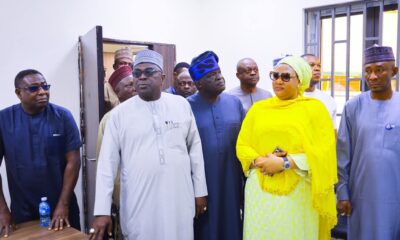

NPC Chairman Visits Kaduna, Tours New Digital Data Centre Facility
-
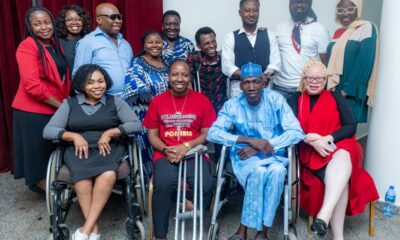

Persons With Disabilities Celebrates 2025 Day, Wants Improved Support From Government, Private Institutions, Others
-
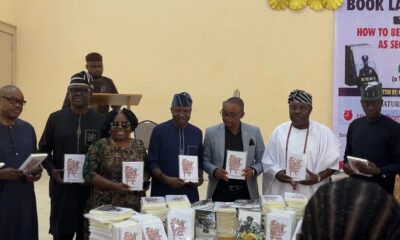

Ekiti RRS Boss, Marcus Ogundola Launch Two New Books
-
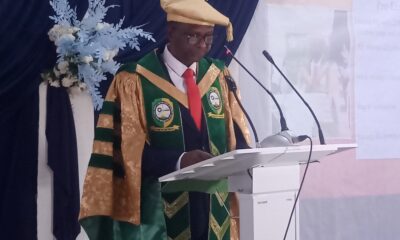

University Don Advocates Fiscal Policy To Address Nigerian Challenges
-
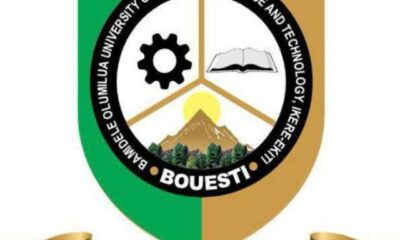

BOUESTI Records Big Win At NUGA Games
-
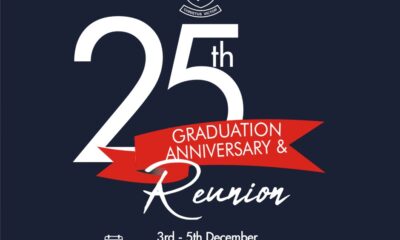

Christ’s School Ado-Ekiti 1994/2000 Set Holds 25th Anniversary December 2025
